- Browse
- Excel
Results for "excel"
 Status: Free TrialFree Trial
Status: Free TrialFree TrialSkills you'll gain: Excel Formulas, Microsoft Excel, Data Cleansing, Data Analysis, Data Import/Export, Spreadsheet Software, Data Wrangling, Data Quality, Pivot Tables And Charts, Google Sheets, Data Manipulation, Data Science, Data Integrity, Information Privacy
4.7·Rating, 4.7 out of 5 stars10K reviewsBeginner · Course · 1 - 3 Months
 Status: Free TrialFree TrialM
Status: Free TrialFree TrialMMicrosoft
Skills you'll gain: Excel Macros, Prompt Engineering, Microsoft Excel, Data Cleansing, Excel Formulas, Pivot Tables And Charts, Microsoft Copilot, Dashboard, Forecasting, Data Presentation, Data Storytelling, Data Processing, Data Visualization Software, Data Manipulation, Data Visualization, Workflow Management, Data Wrangling, Data Quality, Statistical Analysis, Data Transformation
4.2·Rating, 4.2 out of 5 stars269 reviewsBeginner · Professional Certificate · 3 - 6 Months
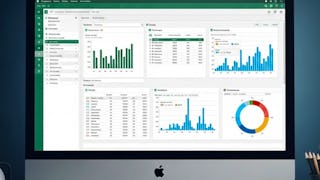 Status: NewNewStatus: Free TrialFree Trial
Status: NewNewStatus: Free TrialFree TrialSkills you'll gain: Microsoft Excel, Pivot Tables And Charts, Excel Formulas, Spreadsheet Software, Business Reporting, Data Visualization, Excel Macros, Dashboard, Forecasting, Data Analysis, Data Visualization Software, Predictive Modeling, Data Validation, Productivity Software, Data Entry, Data Management, Financial Modeling, Data Security, Data Integrity, Computer Literacy
4.9·Rating, 4.9 out of 5 stars64 reviewsBeginner · Specialization · 1 - 3 Months
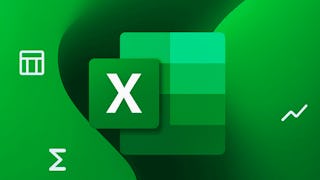 Status: Free TrialFree TrialM
Status: Free TrialFree TrialMMacquarie University
Skills you'll gain: Microsoft Excel, Dashboard, Excel Formulas, Spreadsheet Software, Data Visualization, Excel Macros, Data Validation, Data Cleansing, Data Analysis Expressions (DAX), Data Modeling, Financial Forecasting, Data Management, Business Intelligence Software, Consolidation, Data Integrity, Data Entry, Business Reporting, Productivity Software, Financial Modeling, Loans
4.9·Rating, 4.9 out of 5 stars63K reviewsBeginner · Specialization · 3 - 6 Months
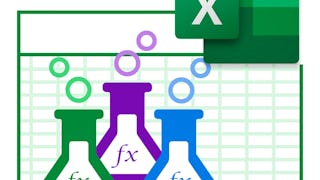 Status: Free TrialFree TrialM
Status: Free TrialFree TrialMMicrosoft
Skills you'll gain: Microsoft Excel, Excel Formulas, Data Visualization, Spreadsheet Software, Microsoft Office, Microsoft 365, Productivity Software, Data Import/Export, Data Management
4.7·Rating, 4.7 out of 5 stars3.2K reviewsBeginner · Course · 1 - 3 Months
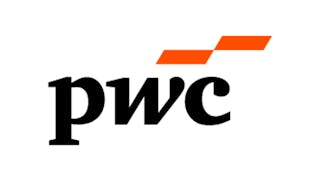 Status: Free TrialFree Trial
Status: Free TrialFree TrialSkills you'll gain: Excel Formulas, Microsoft Excel, Data Cleansing, Spreadsheet Software, Data Validation, Data Analysis Software, Data Analysis, Statistical Analysis, Financial Analysis, Data Management
4.7·Rating, 4.7 out of 5 stars5.4K reviewsBeginner · Course · 1 - 4 Weeks
What brings you to Coursera today?
 C
CCoursera
Skills you'll gain: Microsoft Excel, Excel Formulas, Spreadsheet Software, Microsoft Office, Data Entry, Microsoft 365
4.6·Rating, 4.6 out of 5 stars13K reviewsIntermediate · Guided Project · Less Than 2 Hours
 Status: Free TrialFree TrialM
Status: Free TrialFree TrialMMacquarie University
Skills you'll gain: Microsoft Excel, Data Visualization, Spreadsheet Software, Excel Formulas, Data Management, Data Entry, Productivity Software
4.9·Rating, 4.9 out of 5 stars50K reviewsBeginner · Course · 1 - 3 Months
 Status: Free TrialFree Trial
Status: Free TrialFree TrialSkills you'll gain: Data Storytelling, Data Presentation, Interactive Data Visualization, Data Visualization, Dashboard, Data Visualization Software, IBM Cognos Analytics, Microsoft Excel, Looker (Software), Scatter Plots, Tree Maps, Pivot Tables And Charts, Histogram, Data Analysis
4.7·Rating, 4.7 out of 5 stars4.4K reviewsBeginner · Course · 1 - 4 Weeks

Skills you'll gain: Microsoft Excel, Excel Formulas, Spreadsheet Software, Pivot Tables And Charts, Data Analysis, Data Manipulation, Microsoft Office, Data Mining
4.7·Rating, 4.7 out of 5 stars4.4K reviewsIntermediate · Guided Project · Less Than 2 Hours

Skills you'll gain: Excel Formulas, Spreadsheet Software, Microsoft Excel, Microsoft Office, Microsoft 365, Data Analysis, Business Mathematics
4.6·Rating, 4.6 out of 5 stars2.5K reviewsBeginner · Guided Project · Less Than 2 Hours
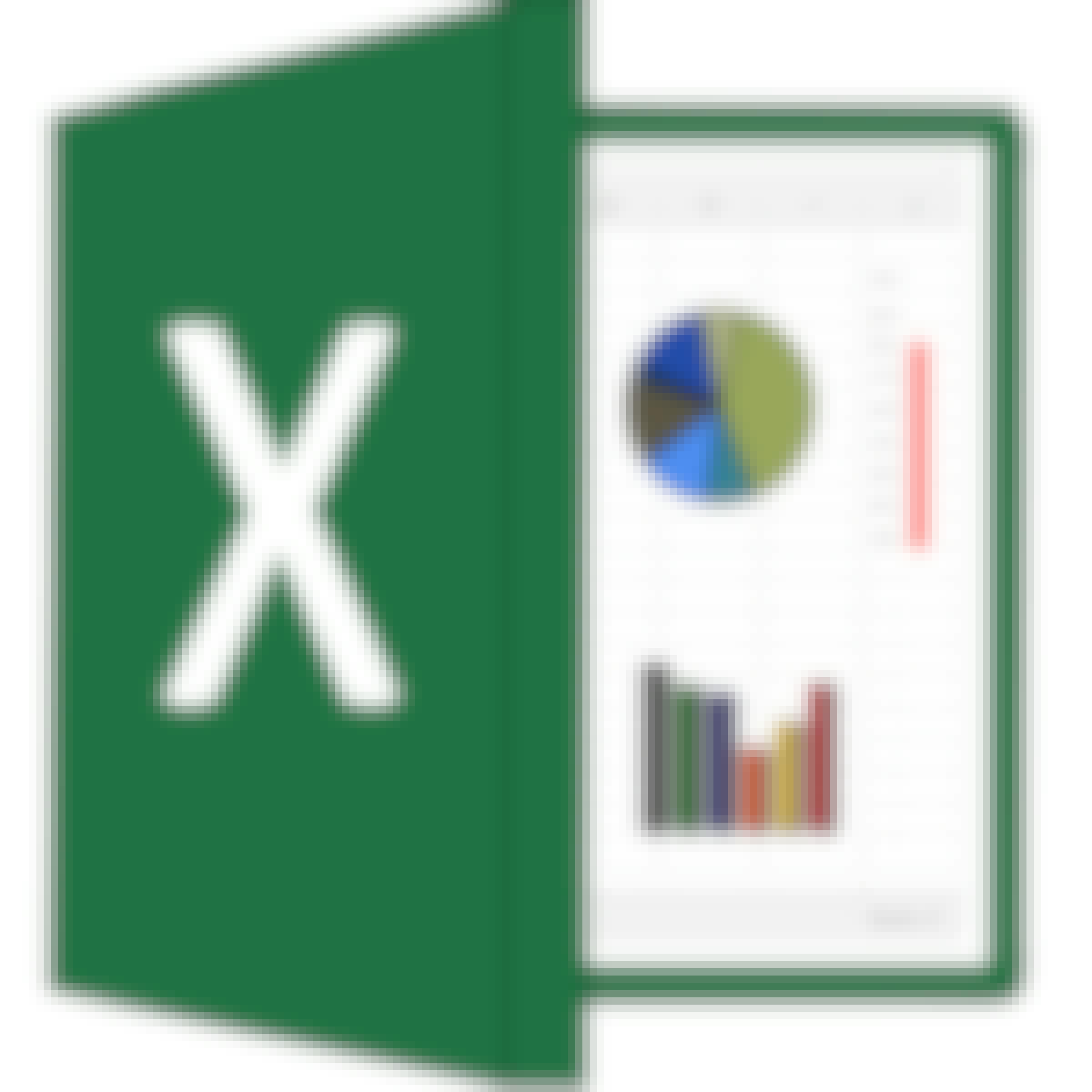 Status: PreviewPreviewJ
Status: PreviewPreviewJJohns Hopkins University
Skills you'll gain: Risk Modeling, Operations Research, Regression Analysis, Microsoft Excel, Business Analytics, Risk Analysis, Business Process Modeling, Business Modeling, Data Modeling, Resource Allocation, Analysis, Statistical Analysis, Mathematical Modeling, Process Optimization, Financial Analysis, Statistical Methods, Predictive Analytics, Transportation Operations, Complex Problem Solving, Linear Algebra
4.8·Rating, 4.8 out of 5 stars4K reviewsIntermediate · Course · 1 - 3 Months
In summary, here are 10 of our most popular excel courses
- Excel Basics for Data Analysis: IBM
- Microsoft Excel: Microsoft
- Microsoft Excel Mastery: From Basics to Pro Skills: EDUCBA
- Excel Skills for Business: Macquarie University
- Work Smarter with Microsoft Excel: Microsoft
- Problem Solving with Excel : PwC
- Getting Started with Microsoft Excel: Coursera
- Excel Skills for Business: Essentials: Macquarie University
- Data Visualization and Dashboards with Excel and Cognos: IBM
- Introduction to Data Analysis using Microsoft Excel: Coursera
Frequently Asked Questions about Excel
Microsoft Excel is a spreadsheet program that enables the user to input data as numbers, formulas, or text that can then be manipulated, organized, stored, and presented. Excel is important to learn because it allows individuals and businesses alike to solve problems quickly and share their results clearly in tables, charts, and graphs.
Excel is a powerful data analysis tool used by businesses worldwide due to its broad range of capabilities and its flexibility in use. For organizations of any size, Excel’s accounting functions can be used to create budgets, complete payroll, and calculate taxes and revenues. Managers can use Excel’s data management functions like pivot tables to summarize large amounts of data for proposals and presentations. And Excel’s financial data analysis functions such as net present value (NPV) and internal rate of return (IRR) can aid investors and financial analysts using discounted cash flow methods to determine project profitability and specific rates of return.
The ability to use Excel is considered a fundamental digital skill in today’s job marketplace, and many jobs require proficiency in it. Although most of the careers using Excel will be in business, there are scientists, engineers, teachers, and graphic designers using this software extensively. Whether you are seeking a new career or looking to supplement your present one, skills in Excel will be a highly valued addition to your resume.
Financial analysts especially depend on Excel skills as they evaluate investment opportunities for banks, mutual funds, insurance companies, and many other businesses. They use current and past financial data, economic and business trends, and industry-specific markers to make the needed assessments that guide their recommendations. According to the Bureau of Labor Statistics, they make a median salary of $85,660 per year, and most start their careers after obtaining a bachelor’s degree in accounting, economics, finance, or statistics.
Absolutely! Coursera offers a wide range of online courses and Specializations on Excel and its use in data analysis and creative problem solving, as well as intermediate and advanced Excel skills for business. You’ll be taking courses presented by top-ranked institutions including the University of Colorado Boulder, Rice University, and Macquarie University, so you won’t have to sacrifice the quality of your education for the flexibility of learning online. You can also get familiar with spreadsheet software by completing a Guided Project, a way to learn on Coursera that helps you build skills with step-by-step tutorials presented by experienced instructors.
You won't need to have many skills or much experience before learning Excel, though you do need some basic computer skills. Being able to type and possessing knowledge of the computer keyboard and all of its shortcuts can also help you have a better understanding of the Microsoft program. You should know how to use the internet and any mobile devices, such as tablets, that may be compatible with Excel. Some basic math skills may also be helpful, as well as an understanding of why spreadsheets are important in business and in daily life.
Almost anyone is best suited for roles that use Excel, because it is such a widely-utilized program. It can be a part of your daily life, or you may incorporate it into your professional life. Anyone who needs to organize data, make tables, create graphics from data, analyze data, make forecasting predictions, or do mathematical functions may use the program. Anyone who wants to improve their business, stay organized, or manage accounts will want to learn it. People who are analytical, good at math, like to keep records, and like to have access to data right at their fingertips may enjoy roles that use Excel.
Learning Excel may be right for you if data from your job or day-to-day tasks require some organization, management, and analysis. The software is used across almost every field by professionals ranging from scientists and teachers to accountants and bankers. For this reason, just learning the software so that you can add the skill to your resume may help you find a job and receive a competitive wage. It can also be beneficial if you want to start your own business. You might use it to keep up with employees, customer information, general business information, performance reports, accounts, and programs so that you can improve your bottom line and run a more efficient company.










